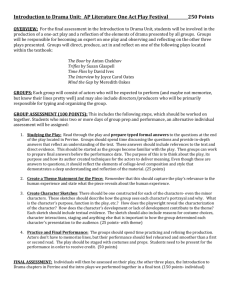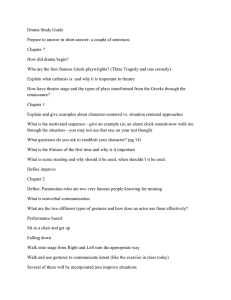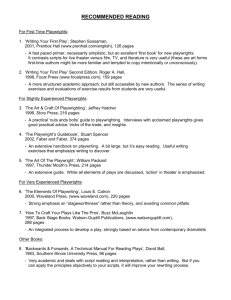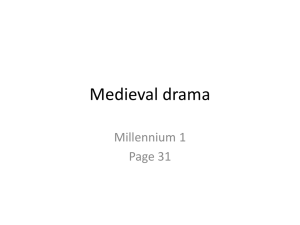The Resources and Problems of Theater in Turkey:
advertisement
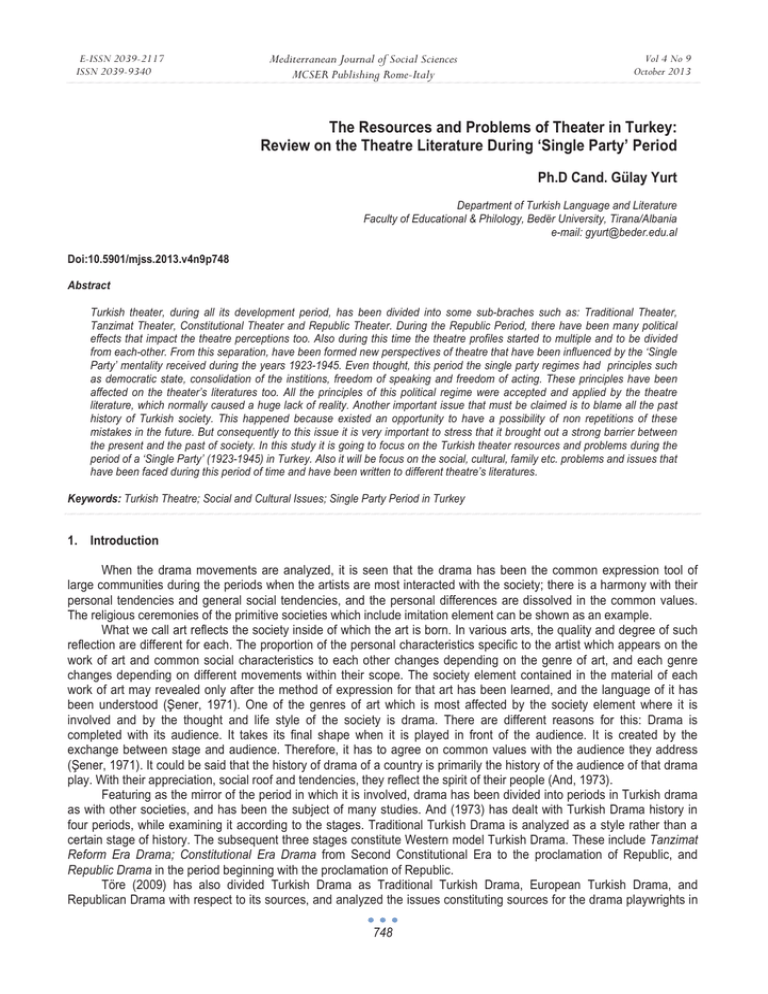
E-ISSN 2039-2117 ISSN 2039-9340 Mediterranean Journal of Social Sciences MCSER Publishing Rome-Italy Vol 4 No 9 October 2013 The Resources and Problems of Theater in Turkey: Review on the Theatre Literature During ‘Single Party’ Period Ph.D Cand. Gülay Yurt Department of Turkish Language and Literature Faculty of Educational & Philology, Bedër University, Tirana/Albania e-mail: gyurt@beder.edu.al Doi:10.5901/mjss.2013.v4n9p748 Abstract Turkish theater, during all its development period, has been divided into some sub-braches such as: Traditional Theater, Tanzimat Theater, Constitutional Theater and Republic Theater. During the Republic Period, there have been many political effects that impact the theatre perceptions too. Also during this time the theatre profiles started to multiple and to be divided from each-other. From this separation, have been formed new perspectives of theatre that have been influenced by the ‘Single Party’ mentality received during the years 1923-1945. Even thought, this period the single party regimes had principles such as democratic state, consolidation of the institions, freedom of speaking and freedom of acting. These principles have been affected on the theater’s literatures too. All the principles of this political regime were accepted and applied by the theatre literature, which normally caused a huge lack of reality. Another important issue that must be claimed is to blame all the past history of Turkish society. This happened because existed an opportunity to have a possibility of non repetitions of these mistakes in the future. But consequently to this issue it is very important to stress that it brought out a strong barrier between the present and the past of society. In this study it is going to focus on the Turkish theater resources and problems during the period of a ‘Single Party’ (1923-1945) in Turkey. Also it will be focus on the social, cultural, family etc. problems and issues that have been faced during this period of time and have been written to different theatre’s literatures. Keywords: Turkish Theatre; Social and Cultural Issues; Single Party Period in Turkey 1. Introduction When the drama movements are analyzed, it is seen that the drama has been the common expression tool of large communities during the periods when the artists are most interacted with the society; there is a harmony with their personal tendencies and general social tendencies, and the personal differences are dissolved in the common values. The religious ceremonies of the primitive societies which include imitation element can be shown as an example. What we call art reflects the society inside of which the art is born. In various arts, the quality and degree of such reflection are different for each. The proportion of the personal characteristics specific to the artist which appears on the work of art and common social characteristics to each other changes depending on the genre of art, and each genre changes depending on different movements within their scope. The society element contained in the material of each work of art may revealed only after the method of expression for that art has been learned, and the language of it has been understood (ùener, 1971). One of the genres of art which is most affected by the society element where it is involved and by the thought and life style of the society is drama. There are different reasons for this: Drama is completed with its audience. It takes its final shape when it is played in front of the audience. It is created by the exchange between stage and audience. Therefore, it has to agree on common values with the audience they address (ùener, 1971). It could be said that the history of drama of a country is primarily the history of the audience of that drama play. With their appreciation, social roof and tendencies, they reflect the spirit of their people (And, 1973). Featuring as the mirror of the period in which it is involved, drama has been divided into periods in Turkish drama as with other societies, and has been the subject of many studies. And (1973) has dealt with Turkish Drama history in four periods, while examining it according to the stages. Traditional Turkish Drama is analyzed as a style rather than a certain stage of history. The subsequent three stages constitute Western model Turkish Drama. These include Tanzimat Reform Era Drama; Constitutional Era Drama from Second Constitutional Era to the proclamation of Republic, and Republic Drama in the period beginning with the proclamation of Republic. Töre (2009) has also divided Turkish Drama as Traditional Turkish Drama, European Turkish Drama, and Republican Drama with respect to its sources, and analyzed the issues constituting sources for the drama playwrights in 748 E-ISSN 2039-2117 ISSN 2039-9340 Mediterranean Journal of Social Sciences MCSER Publishing Rome-Italy Vol 4 No 9 October 2013 each period in his work. Turkish Drama and the issues dealt with had been shaped around European style drama until 1908. In this period, generally love and family relationships were treated. The families that make a spectacle of themselves while imitating the European life style; superstitions and the incidences caused by the people who believe such superstitions and marriage problems arising from age gap can be shown as an example for such themes (YalçÕn, 2002). The West has created their drama that meets their own requirements as specific to themselves in accordance with their life style, belief and mythology in time. This style is related to conflict (thesis and antithesis) with respect to its content and technical structure. It should be noted that the facts of conflict and themes of conflict in Greek mythology constitute the source and philosophy of European life style. However, Turkish society had never been in this type of conflict (God-Human), until they approached to the West (Töre, 2009). The comedies which were not directly affected by the political atmosphere of that period (Karagöz and Theathre-in-the-round) are also the works that were staged in that period. The plays in Tanzimat reform era are thesis plays. The content of the plays is necessarily full of issues criticized or argued. Such issues seem to be the reflections of the social and political atmosphere of that period. In the plays, many reasons and troubles that make a spectacle of the society and cause the society go back such as the heavy pressure of the traditions and customs on the society, prearranged marriage, sad marriages caused by the force of families, forcing the girls to marry rich and old men, marriage to more than one woman, family, woman and education and discipline of the adolescents, slavery, obedience to parents, loves made impossible, chastity, extramarital affairs in violation of the manners and customs, objection to blood feud, pacta sunt servanda, class discrimination, deteriorated religious belief, mockery with such superstitions as fortune, magic and witchcraft, divorce, addiction to fashion, Islamic unity and sense, patriotism, importance of liberty, longing for Constitutional era, and admiration for the West had been treated, and the issues were shared with the people without analyzing the issues in-depth and proposing new offers, only by highlighting the exemplary part of them with respect to their results. In this way, the faults and drawbacks experienced by our society had been honestly presented. The social and cultural depression in the country caused by the European life style has led the people to new explorations in accordance with the opinions suggested by these playwrights (Töre, 2010). When the Republican drama is reviewed, a society profile is revealed. This profile includes our moral, economic and cultural values, various problems and ideals. In this study, beginning from the earlier years of the proclamation of Republic which is also known as the Single Party period between 1923 and 1950, the dramas dealing with such themes as “Improper Westernization, Traditional Values and Family, Economic Problems, Cultural Problems, and Ideology,” will be analyzed, and these issues will be provided under different headings along with their examples. 2. Improper Westernization The playwrights of Republican period reflect the change of values arising from the Westernization movement in their plays. While the observations, interpretations and critiques of our playwrights in this respect have small differences compared to their subjective perspectives, they have a lot in common in many aspects. Our playwrights deals with this issue as a social ethics and culture. Westernization is an inevitable development for our society. The critiques are not against the Westernization itself, but misunderstanding and misapplication of the Westernization. While criticizing misunderstanding of Westernization, it has been mostly indicated that the traditional values are also corrupted, and therefore, care has been taken not to seem as single-sided, especially seem to be against the West and side with the East while criticizing the values (ùener, 1971). On the other hand, drama has also criticized the traditional value judgments. The extent of such criticism is the value measurements underlying the Western culture and civilization wanted to be adopted. The manners and customs regulating the patriarchal family order as well as the relationships between women and men have also been criticized with respect to these values. It has been suggested that the social moral and law rules applied in wider relationships have been increasingly violating the human rights beyond those relationships, and it has been suggested that the reactionary and fundamentalist tendencies especially in the conservative circles are made an element of oppression, and even, a way of exploitation. A play which was staged in 1927 at Darülbedayi; however, cancelled upon being considered against the revolutions after several performances: Sa÷anak, a work written by Yakup Kadri Karaosmano÷lu does not reflect the impact of the revolutions on the society from a realistic and objective point of view. Sa÷anak, when looking with respect to present, is not against the revolutions but is more convincing and revolutionist than the revolutionist plays of 19331934's. In this play, a critical attitude has been adopted, which heads towards the wisdom and reason in contrast to the planar thought ad emotional beliefs of other plays written for revolutionist purposes (Karaosmano÷lu, 1934). What may 749 E-ISSN 2039-2117 ISSN 2039-9340 Mediterranean Journal of Social Sciences MCSER Publishing Rome-Italy Vol 4 No 9 October 2013 have scared the governors during the period when it was staged was this intellectual and critical point of view that they were not used to then (ùener, 1971). Another playwright is Reúat Nuri Güntekin who did not judge the sides although he saw the conflicts within the society; tried to understand both of the opposite elements, and approached with affection to all miseries. In the plays that he wrote before the proclamation of Republic, it is seen that he used to adopt a humanistic point of view beyond the strict social rules and exalt the behaviors which he considered honorable in terms of humanity and civilization. In his plays titled Eski Rüya, Taú ParçasÕ, and Hançer, he displays the grief of the hero who gets stucked in the troubles not created by opposite powers but inevitable facts. Another playwright is Hüseyin Rahmi GürpÕnar who considers the problems arising from misunderstanding the Westernization from a different angle, and displays the conflict of new value judgments, and assesses the result with respect to the social ethics. GürpÕnar considers the problem as the disability of people’s sense of innovation. He has stated his point of view in this respect with his play titled KadÕn Erkekleúince written in 1932 (GürpÕnar, 1933). With his play titled Bir Misafir Geldi published in 1939, Celalettin Ezine has considered the conflict of values within the scope of a family issue. Suggesting that the new culture is to be adopted by getting the strengths of the traditional value judgments, as well, the playwright has stated that the habit of getting everything from the West directly without making choice tarnishes the national culture and moral sense (Ezine, 1931). Cevat Fehmi Baúkut has dealt with the conflict of values arising from the Westernization in his play titled AyarsÕzlar. The playwright has also criticized another kind of imitation of the West in his play titled Harputta Bir AmerikalÕ (Baúkut, 1943). Many other playwrights in Republican Period drama have pointed out the change in their value judgments caused by the Westernization in the plays they have written. It is seen that this matter has been repeatedly treated beginning from 1927’s to the recent years within the period we study. 3. Traditional Values and Family In this section, the plays where the manners are criticized are discussed. The playwrights of the Republican period adopt the human rights and freedom principle, and find some of our traditions obsolete. They mostly tend to women’s rights and woman-man relationships. The main problem caused by the pressure of manners is the family issues. First generation playwrights of that period have considered the woman generally as inclined to family bonds and betraying. Such playwrights as Halit Fahri Ozansoy, NazÕm Hikmet, Necip FazÕl and Cevdet Kudret blame the woman for infidelity. In the play titled Bir Adam Yaratmak written by Necip FazÕl KÕsakürek, there is an old-time family portrait within the background of the events as depicted (KÕsakürek, 1938). NazÕm Hikmet Ran considers the manners as the patterns not fed intrinsically in his play titled Bir Ölü Evi. The passion for interests underlies the family relations, instead of love, respect and understanding (Ran, 1932). The unhappy marriages of those adolescents who are married to someone else other than the person whom they fall in love with by the force of their families as required by the manners, and their efforts to hide such marriage had been subject to many plays within that period. This theme has been dealt with in Orhan Asena’s plays titled KapÕlar and Gecenin Sonu, and two marriages established in accordance with the traditional rules are compared with a real love relationship (Asena, 1968). Necati CumalÕ has indicated in his play titled Boú Beúik that a woman in a village is ill-treated by the family of her husband, and even, all of the people around her as long as she could not give birth to a boy. Another tradition put on stage within a village environment is the blood feud. Our playwrights show that such tradition is still maintained in Anatolia today. It is seen that in all the foregoing plays, the playwrights focus on the failing aspects of the traditions and manners. Such failure mostly affects the family and the woman. It is seen that the patriarchal family order not only renders the women unhappy, but also it indirectly renders the husband unhappy. The drawbacks of the pressure on the woman-man relationships both in villages and cities are pointed out, and it is indicated that it leads to unhappiness especially that their marriage is not built on love, and love is condemned. Some of the manners constitute a negative element of oppression not only in woman-man relationships, but also in other domains of life. The playwrights have also taken attention to the aspects of the manners conflicting with the contemporary civilization. The leading playwrights who argue for a reformist opinion against the pressure of manners are Reúat Nuri Güntekin, Musahipzade Celâl, and NazÕm Hikmet. NazÕm Kurúunlu, Orhan Asena, Necati CumalÕ, Turgut Özakman, Refik Erduran, Cahit Atay, Adalet A÷ao÷lu and Nezihe Meriç have followed them, and analyzed this issue thoroughly. 750 E-ISSN 2039-2117 ISSN 2039-9340 Mediterranean Journal of Social Sciences MCSER Publishing Rome-Italy Vol 4 No 9 October 2013 4. Economic Problems In the period discussed, the playwrights have also concerned with the economic problems. In the plays written in 1930’s following to the proclamation of Republic, the end-of-war crisis has been analyzed, and in the plays written between 1940’s and 1950’s, the problems arising from the impact of the World War II on the national economy have been treated, and in both periods, black-marketeering and profiteering have been criticized (ùener, 1971). Again in the plays written in this period, the situation of the people has been displayed as the victims of laws, conscience, manners, and immoral trickery. The playwright who has first dealt with the exploitation issue in the Republican Period is Musahipzade Celâl. In his play titled FermanlÕ Deli Hazretleri written in 1924 as well as in his play titled Gülsüm written in 1905 and edited later, the playwright has told that those who lived in Istanbul and worked as officers in the government offices during Ottoman Empire had exploited the people, and especially, they had left the Anatolian people poor through various taxes. Vedat Nedim Tör, in his play titled øúsizler, has indicated the profiteering and exploitation order in the personality and life style of a spendthrift. The son, RÕdvan increases the fortune that his father made during the World War I by profiteering through engrossing and hoarding. The poverty of people in the country increases in direct proportion to the fortune of the profiteer. This terrific mill will grind those honorable people eventually. It is almost impossible to challenge such order. Cevat Fehmi Baúkut has pointed out the same observation in all of his play written in earlier 1950’s: Forgetting the real values against the power and importance of money, underestimation of knowledge and art, and making the money a passion and the trade an illegal order that realizes such passion are mentioned. In Bir DolaptÕr Dönüyor, Halit Fahri Ozansoy has indicated that all the institutions are involved in a corrupt order. The government is bad and the people are poor and unhappy in the country. The sly vizier is up to undercover works, who governs the old and awkward people of the country. He makes them wear rose-tinted spectacles so that his order could not be grasped and the people will not recover consciousness. In this country where the intellectuals are irresponsible and scholars are coward and toadyish, noble ideals are mentioned to cover the ugly facts. 5. Cultural Problems Two cultural problems in dramas are caused by the irresponsibility of individual and unconciousness of the society. In fact, these problems are likely to be solved through education. The people cannot see the disorder or remain insignificant to it, while they are overwhelmed by the power of money and authority and engaged with their own affairs. In the play titled økinci BaskÕ, Refik Erduran has dealt with the fight started by a journalist to announce the corruptions around him as in the play titled Güneúte On Kiúi. In this play, the journalist has got disappointed to see that the sad truths he announced to the people with various difficulties do not provoke any reaction. Those rich people who live a luxurious life with their income earned by improper means are the heroes of people, and the news related to their lives are more interesting for people rather than the news explaining their corruptions. In Vedat Nedim Tör’s play titled Da÷ BaúÕndaki KÕz, two young girls who teach a school in Anatolia were defeated in a fight against the reactionary and unconscious people around them by being slandered. Sermet Ça÷an, in his play titled Ayak Bacak FabrikasÕ, the people who have become paralyzed after eating the black seed despite the warnings of a young man are both poor and desperate as well as illiterate and unconscious. Aziz Nesin, in his play titled Toros CanavarÕ, highlights that the individual needs to fight consciously against the power of money and brute force, and has to reject accepting to be overwhelmed. He mentions that it is impossible to challenge the evil with the old-time virtues, as long as the people hold the social order maker, oppressor and harmful people in high-esteem as they have money, and neighborhood bullies, as they have brute force and indecent. 6. Ideologies The playwrights of that period have also written such plays that appreciate the sound values and positive efforts. These plays include the ideals rather than problems and mention the happy cases where the ideals are realized. During the period between 1930’s and 1940’s, such plays that reflect the nationalism, populism and revolutionism believes of Republican Turkey have been written, and in recent years, there have been written such plays that lead to contemporary values and positive actions which enable the development of the country with international and universal ideals. 751 E-ISSN 2039-2117 ISSN 2039-9340 Mediterranean Journal of Social Sciences MCSER Publishing Rome-Italy Vol 4 No 9 October 2013 Faruk Nafiz ÇamlÕbel, in his play titled Özyurt published in 1932, has mentioned the Central-Asian Turks, and stated that old Turkic people used to be civilized people, and they brought civilization wherever they went, and finally, they have brought civilization to the Anatolia. In this play, Turks’ love of art and efforts to establish cities have been praised. Yaúar Nabi NayÕr, in his play titled Mete, has mentioned the nationalism ideal. The virtues of Turkish nation date back to their glorious days centuries ago. Having spread fear to all the European nations with their armies achieving victories over victories, Mete Khan was one of the bravest men of those glorious days. Mete Khan was a leader not only for his power during war and superhuman bravery, both also that he resisted to maintain peace and gave importance to the art. Behçet Kemal Ça÷lar reflects his point of view about the virtues and civilization of Turkish race with his plays titled Çoban and Attila. 7. Conclusion Turkish drama between 1923 and 1950 was optimistic because the perspectives of the government and the people were optimistic with the proclamation of Republic despite poverty. It was not reactionary but innovative. The renewal of institutions, education and laws had a great impact on this optimism. There is not seen so muck tragic cases in these years. The drama themes between 1923 and 1950 are mostly instructive and hortative. The drama of this period has nothing to do with the structure of environment and society but involved the social problems. It only reacts to the aspects of environment and society that lead the person as an individual to unhappiness. It expresses an opinion about the facts and problems of Turkish society with being concerned with the facts and problems of the society. In the Republican period, the values related to the manners and ethics, and the associated problems are given priority. There are such plays as Moral values, Value changes and checking the traditional values. The playwrights criticizing the value changes consider the Westernization as the reason for such change. The playwrights are not against the tendency to adopt the actual Western culture but they think that the Westernization is misunderstood. Those people who are not familiar with the West and Western values and who could not grasp the essence of these values will try to adapt the Western patterns to their lives through imitation, and this will cause conflicts within the society. While the wrong impact of Westernization movement is satirized, the traditional values are criticized. The traditional values criticized in these plays are those which have got old and ineffectual. They have become invalid within the order of society. They hold the individuals unnecessary under pressure. They are satirized for the account of such rights granted by civilization to the individual as human rights, individual freedom and natural rights. Especially, maintaining the patriarchal order within the family; violation of the women’s rights and young generation’s right to love and choose a partner, faulty way followed in child discipline, and not delivering education to the adolescents are all criticized, and it is shown that such faulty attitudes cause the depression of young and unhappiness of women. Another problem is the economic irregularity within the society. Such irregularity sometimes raises concerns about the poverty of people, and sometimes about profiteering and exploitation. Profiteering is not only an economic problem that satirized the environment eligible for profiteering, but also a moral problem that accuses the profiteer in the name of ethics. And poverty is considered together with both its economic and cultural factors. Our playwrights have not only dealt with the problems, but sometimes they have also suggested solutions for these problems. The plays focused on the ideals have begun to be written mostly between 1933 and 1935. The idealist plays written between 1933 and 1935 are the plays which aims at making the people adopt the Ataturk’s Revolutions. The principles they are concerned include the populism, nationalism and revolutionism as the fundamental principles of Republican Turkey. In general, the social problems have been focused in Republican period Turkish drama, and the facts, value judgments, and economic, cultural and moral values of the society in this period have been mentioned, and the truths have been tried to be shown, and the mistakes have been tried to be criticized. References ùener, S. (1971). Ça÷daú Türk Tiyatrosunda Ahlak Ekonomi Kültür SorunlarÕ (1923-1970) Ankara: Ankara Üniversitesi BasÕmevi And, M. (1973). 50 YÕlÕn Türk Tiyatrosu. østanbul: øú BankasÕ Kültür YayÕnlarÕ Asena, O. (1964). Gecenin Sonu. Ankara: Toplum YayÕnlarÕ Asena, O. (1968). KapÕlar. Ankara: Ankara Üniversitesi YayÕnlarÕ Baúkut, F. (1943). AyarsÕzlar. østanbul: ønkilap BasÕmevi 752 E-ISSN 2039-2117 ISSN 2039-9340 Mediterranean Journal of Social Sciences MCSER Publishing Rome-Italy Vol 4 No 9 October 2013 Ezine, C. (1931). Bir Misafir Geldi. østanbul: Kenan BasÕmevi GürpÕnar, H. R. (1933). KadÕn Erkekleúince. østanbul: Hilmi Kitap KÕsakürek, N. F. (1938). Bir Adam Yaratmak. østanbul: Sühulet Kitabevi Karaosmano÷lu, Y. K. (1934). Sa÷anak. VarlÕk Dergisi Musahipzade, C. (1936). FermanlÕ Deli Hazretleri. østanbul: Kanaat YayÕnlarÕ Ran, N. H. (1932). Bir Ölü Evi. østanbul: Ahmet Halit Kütüphanesi Tör, V. T. (1924). øúsizler. østanbul: ùehir TiyatrolarÕ Töre, E. (2010). II. Meúrutiyet Tiyatrosu -Temalar- . østanbul: Digital Sanat YayÕnlarÕ Töre, E. (2009). Türk Tiyatrosunun KaynaklarÕ. Turkish Studies International Periodical For th Languages, Litetaruter and History of Turkish , 4 (I-II), 2181-2348 YalçÕn, A. (2002). II. Meúrutiyette Tiyatro EdebiyatÕ Tarihi. Ankara: Akça÷ YayÕnlarÕ 753

